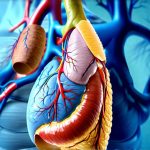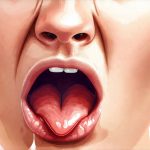Gastroesophageal reflux disease (GERD) is a surprisingly common condition affecting millions worldwide. Many associate it solely with heartburn, but its manifestations are far more diverse, often extending beyond the typical burning sensation in the chest. One lesser-known symptom that can be particularly perplexing – and even alarming – is the sudden urge to cough after taking deep breaths. This isn’t necessarily a sign of respiratory illness; instead, it frequently indicates an interplay between GERD and the vagus nerve, triggering a physiological response that leaves individuals feeling like they need to clear their airways, even when no phlegm or mucus is present. Understanding this connection can alleviate anxiety and guide appropriate management strategies.
The sensation isn’t always straightforward. It’s not merely a cough in the traditional sense; it’s often described as an urgent need to cough, a tickle, or a feeling of something being stuck in the throat. Deep breaths, while normally associated with relaxation and improved oxygen intake, can paradoxically exacerbate this sensation for those with GERD. This is because taking a deep breath creates negative pressure within the chest cavity, which can facilitate the backward flow of stomach acid into the esophagus – even if heartburn isn’t immediately felt. This acidic reflux then stimulates nerve endings in the esophagus, sending signals to the brain that are misinterpreted as needing to clear the airway, resulting in the cough urge. It’s a complex interplay between physiology and symptom perception, making it crucial to understand the underlying mechanisms.
The Vagus Nerve Connection
The vagus nerve is often called the “wandering nerve” because of its extensive reach throughout the body. It’s a cranial nerve responsible for many vital functions including heart rate regulation, digestion, and even breathing. Critically for understanding this symptom, it also plays a key role in the gastro cough reflex. This reflex is designed to protect the airways from irritation. When acid reflux reaches the esophagus, it can stimulate receptors along the vagus nerve. This stimulation sends signals to the brainstem, which then triggers the urge to cough as a protective mechanism – even if there’s nothing physically obstructing the airway. Essentially, the body perceives the acidic irritation as a threat and attempts to clear it away through coughing.
The intensity of this reflex can vary greatly from person to person. Some individuals might experience only a mild tickle, while others feel an overwhelming compulsion to cough after even small amounts of reflux. This variability is influenced by several factors including individual sensitivity to acid, the strength of the lower esophageal sphincter (LES) – the muscle that prevents stomach acid from flowing back up – and the overall health of the vagus nerve itself. Chronic GERD can sometimes lead to increased vagal nerve sensitivity, making individuals more prone to this cough urge even with minimal reflux.
Furthermore, the deep breath exacerbates the issue because it further stimulates the vagus nerve. The act of inhaling deeply stretches the lungs and creates a change in pressure that heightens vagal tone. In someone with GERD, this increased stimulation combined with esophageal irritation can be enough to trigger the cough reflex. It’s not the breath itself causing the problem; it’s the interaction between the deep breath, acid reflux, and the highly sensitive vagus nerve.
Diagnostic Considerations & Differential Diagnoses
It’s essential to distinguish this GERD-related cough urge from other potential causes of coughing. Many conditions can mimic these symptoms, making accurate diagnosis paramount. A thorough medical evaluation is crucial. This typically begins with a detailed patient history, focusing on the timing and characteristics of the cough – when does it occur, what makes it better or worse, are there any associated symptoms like heartburn, regurgitation, or difficulty swallowing?
A healthcare professional will likely want to rule out other respiratory conditions such as asthma, chronic bronchitis, postnasal drip, allergies, and even lung diseases. Diagnostic tests may include: – Pulmonary function tests (PFTs) to assess lung capacity and airflow. – Chest X-ray or CT scan to identify any structural abnormalities in the lungs. – Allergy testing to determine if allergens are contributing to the cough. – Endoscopy, a procedure where a thin flexible tube with a camera is inserted into the esophagus to visualize any inflammation or damage caused by acid reflux. – Esophageal manometry and pH monitoring to assess LES function and measure acid exposure in the esophagus.
It’s important not to self-diagnose. The cough urge linked to GERD can be subtle, and overlapping symptoms with other conditions mean that a professional evaluation is vital for accurate identification and appropriate treatment planning. Misdiagnosis can lead to ineffective treatments and prolonged suffering. A proper diagnosis will help determine the best course of action, whether it involves lifestyle modifications, medications, or further investigations. If you’ve recently had surgery, consider exploring digestive issues after surgery.
Lifestyle Modifications & Dietary Adjustments
Managing GERD-related cough often begins with lifestyle and dietary adjustments aimed at reducing acid reflux. These changes can significantly minimize vagal nerve stimulation and lessen the urge to cough.
- Dietary Changes: Avoiding trigger foods is paramount. Common culprits include: – Fatty and fried foods – these slow down digestion and increase stomach pressure. – Chocolate – relaxes the LES. – Caffeine – also relaxes the LES and increases acid production. – Alcohol – has a similar effect to caffeine. – Spicy foods – can irritate the esophagus. – Citrus fruits and tomatoes – are highly acidic.
- Elevating the Head of Your Bed: Raising the head of your bed by 6-8 inches using blocks or a wedge pillow helps prevent stomach acid from flowing back up into the esophagus while you sleep.
- Eating Smaller, More Frequent Meals: Large meals put more pressure on the LES and increase the risk of reflux.
- Avoiding Eating Before Bed: Allow at least 2-3 hours between your last meal and bedtime to give your stomach time to empty.
- Maintaining a Healthy Weight: Obesity increases abdominal pressure, contributing to GERD symptoms.
These modifications are often the first line of defense and can be surprisingly effective for many individuals. Consistency is key; making these changes part of your daily routine will yield the best results. Remember that identifying your specific trigger foods may require some experimentation and careful observation. If you find yourself struggling after a particularly difficult meal, consider looking into how to soothe the gut afterwards.
Medications for GERD Management
When lifestyle changes aren’t enough, medications can help manage GERD symptoms and reduce acid reflux. There are several classes of drugs available, each working in a different way.
- Antacids: These neutralize stomach acid and provide quick but temporary relief from heartburn and associated discomfort. They’re best for occasional symptoms rather than chronic GERD management.
- H2 Blockers: These reduce the amount of acid produced by the stomach, providing longer-lasting relief than antacids.
- Proton Pump Inhibitors (PPIs): PPIs are the most potent medications available for reducing stomach acid production. They’re often prescribed for more severe GERD or when other treatments haven’t been effective. However, long-term use of PPIs has been linked to potential side effects, so it’s important to discuss the risks and benefits with your doctor.
- Prokinetic Agents: These medications help speed up digestion and strengthen the LES, reducing reflux. They are less commonly used than other GERD medications but can be helpful in certain cases.
It’s crucial to work with a healthcare professional to determine the most appropriate medication regimen for your specific needs. Never self-medicate or adjust your dosage without consulting a doctor. The goal is to find a treatment plan that effectively manages your symptoms while minimizing potential side effects. Understanding how to reset the gut can also be helpful in long term management.
Addressing Vagal Nerve Sensitivity & Future Research
While managing acid reflux is central to addressing the cough urge, some individuals may benefit from strategies aimed at modulating vagal nerve sensitivity. Techniques like deep breathing exercises (ironically!), mindfulness meditation, and even gentle yoga can sometimes help regulate the nervous system and reduce overstimulation of the vagus nerve.
Research into the specific mechanisms underlying the gastro-cough reflex is ongoing. Scientists are exploring potential therapies targeting the vagus nerve directly to alleviate symptoms. Furthermore, a greater understanding of individual variations in vagal sensitivity could lead to more personalized treatment approaches. The key takeaway is that this symptom isn’t simply about acid; it’s about the complex interplay between digestion, neurology, and our bodies’ natural protective mechanisms. If you are experiencing related health challenges, consider how to plan for the future. It’s also important to remember that managing chronic conditions can impact other areas of life; resources on employment during treatment may be valuable. Finally, don’t underestimate the importance of self-care – learning how to cope with fatigue can significantly improve your overall well-being. Continued research promises to unlock even more effective strategies for managing this often-frustrating condition and improving quality of life for those affected by GERD. Recognizing the signs of liver failure is also important, as gastrointestinal issues can sometimes be related to other underlying conditions.


















